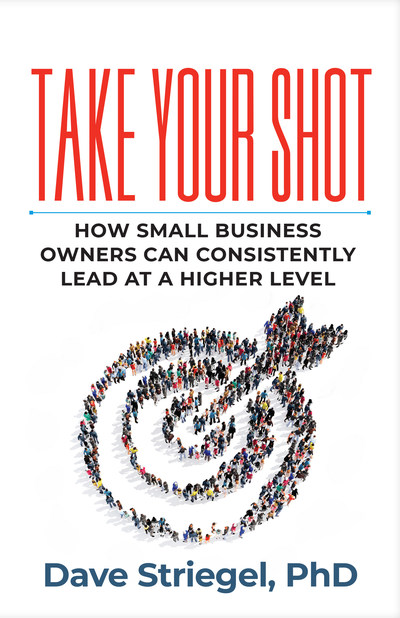SAN DIEGO, July 23, 2021 /PRNewswire/ — Your biggest critic, the dreaded voice inside your own mind, can undermine your pursuit of excellence, particularly in high-stress, high-pressure situations. To battle and ultimately quiet your inner critic, you must clearly define your purpose.
That’s the advice of sport psychology expert and world class performance coach Dave Striegel PhD, author of the book Take Your Shot: How Small Business Owners Can Consistently Lead at a Higher Level (2021, Indie Books International).
“Our internal critic tries to torpedo whatever new behaviours we implement,” explains Striegel. “So establishing a foundational routine of focus to improve productivity is difficult.”
Striegel is a highly sought-after performance coach and speaker who specializes in helping leaders in high-stress environments pursue excellence and thrive under pressure. He’s worked with individuals, teams, and organizations, including professional and elite amateur athletes, Fortune 500 executives, business owners, doctors, top educators, and law enforcement specialists.
“To give yourself the best chance for success, you have to get your own mind in the right place, so you can be responsive to whatever situations arise,” Striegel advises.
According to Striegel, in order to gain consistent traction toward our goals, you need to adopt strategies for silencing the critic in your mind. One such strategy is defining a clear purpose that serves as a motivational anchor as to why you are trying to be really good at your chosen activity or endeavour.
“Once you are clear on why you decided to pursue this path, give your inner critic an identity and craft strategies designed to lessen its impact on you.”
Here are five tips from Striegel about how to build a foundation to combat the nagging voice of doubt, or other forms of demotivation that can sap your willpower.
- Take creative steps to establish a deep emotional anchor to the reason why you want to pursue excellence by making it visual.
- Include the benefits of achieving your goal in terms of what it will do for you, and the consequences of not achieving your goal, especially how failure might impact those people you care about most.
- Surround yourself with equally motivated, like-minded people who can challenge and support you on your path toward pursuing excellence.
- Think of an analogy that will give your inner critic a platform and identity. The analogy should resonate for you. For example, a musician or actor may imagine their inner voice as a person running across stage during their performance.
- Understand that your inner critic—a characteristic of being human—will reveal itself in high-pressure moments. Do not be surprised. Instead, acknowledge its presence and create a powerful and possibly even humorous verbal response you can use when your inner critic surfaces. This will help lessen its effect.
Striegel adds that as much as we need to lay out a thoughtfully constructed plan for implementing key changes in our business, we need to be adaptable and prepared for the reality that events will “most assuredly will be different than you anticipate, even messy.”
“Not only must you prepare for your decisions to go well,” says Striegel, “of arguably greater value is preparing your response if they do not.”


